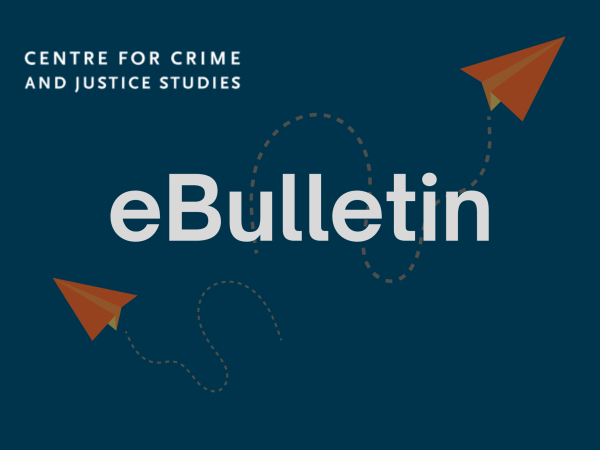
The long shadow of imprisonment.
The heavy price being paid by prisoners from the ongoing COVID-19 lockdown is well-documented. As my colleague Roger Grimshaw recently noted, the Chief Inspector of Prisons, Charlie Taylor, is concerned about the cumulative effect of the prolonged and severe restrictions on prisoners' mental health and well-being.
Roger goes on to float the idea of a "prisons covenant", setting out principles and safeguards that would benefit staff and prisoners alike. In the more immediate term, we will continue to make the case for vaccinating all staff and prisoners as soon as possible.
Even in the best of times, imprisonment exacts a heavy toll on prisoners. And these are far from the best of times. But as a new study points out, the shadow prisons cast is long; one whose effects ex-prisoners feel long after release.
I was one of the co-authors of the study, though my own contribution was relatively modest compared to the detailed data crunching and analysis done by others.
What does the analysis tell us? As the lead author, Paul Bebbington points out in a summary he has has written for our website, ex-prisoners manifest far higher rates for a range of psychiatric problems than the general population.
As Paul writes:
...ex-prisoners suffered greatly increased rates of current psychiatric problems, including anxiety and depression, psychotic disorder, post-traumatic disorder, substance dependence, and suicide attempts. They had twice the rate of anxiety and depression seen in the rest of the sample, even after adjusting for trauma and current socioeconomic adversity. They also appeared to have experienced difficulties dating back to childhood: deficits in attention, hyperactivity, autistic traits.
As he goes on to point out, without effective liaison between prisons, the wider justice system, and mental health services, ex-prisoners' vulnerability to ongoing mental health problems are only going to continue.
Beyond these important policy and practice considerations, the research reminds me of an essential truth. Prisons are harmful places; far better at damaging lives and compounding problems than they are at helping and healing.
Improved coordination between institutions and services is certainly needed. So is serious action to reduce unnecessary imprisonment and shrink the footprint of our prison system.
As Roger Grimshaw concludes, in the article I mention above:
...the infinite extension of prison capacity to suit sentencers’ judgements and meet the wishes of governments is self-defeating. It will only be curbed and reversed if policymakers start to acknowledge fully the reality of imprisonment and act responsibly in the interests of us all.

Richard Garside
Director
News and Commentary
This month Mike Guilfoyle asks how those working in probation can do better, amidst relentless organisational reforms.
Professor Paul Bebbington summarises his research - co-authored with Richard Garside and others - on ex-prisoner vulnerability.
Have you seen the webinar videos from our 'COVID-19 in prisons' series? We will be hosting the last in the three-part series in the summer. Keep an eye out for further updates on speakers and registrations.
Projects latest
This week, Matt Ford looks at some aspects of the COVID-19 strategy in prison which could have been handled better.
An eye on criminal justice
For a year now, we have been publishing analyses and articles, as well as hosting webinars looking at COVID-19 in prisons. We have been calling for urgent protection for prisoners, as well as early release for those in prison who pose no risk to public safety. Inside Time recently revealed that despite the increased risk of death and serious illness from COVID-19 in prisons in comparison with community rates, fewer people in prison have been vaccinated. Read more from Inside Time on vaccination de-prioritisation in prisons.
After the disappearance and death of Sarah Everard and subsequent vigil, HM Inspectorate of Constabulary and Fire & Rescue Services (HMICFRS) has published its inspection report into the Metropolitan Police Service's (MPS) handling of the vigil. The report, which represented only police perspectives, found that the MPS behaved legitimately with the aim to conduct their duties with consistency during the pandemic. However, the report criticised the communication between police commanders in addressing the unfolding situation. The views of those who attended the vigil were not represented in the report.
An official complaint by whistleblower, Alice O'Keefe has been submitted to her employer, HM Inspectorate of Constabulary and Fire & Rescue Services (HMICFRS) over official investigations and reporting on the policing of protests. O'Keefe asserts that official government reports on peaceful protests has been "skewed in favour of the government view" biased against protestors and lenient towards police behaviour.
A recent public session of the Justice Committee aired further damning reports of mistreatment of children at Rainsbrook Secure Training Centre. Rainsbrook, run by private firm, MTC has been found to be locking children in their cells for just under 24 hours a day for up to 14 days. This inhumane treatment sits alongside other serious findings of "poor performance", despite serious concerns being raised since 2016 and false performance improvement reports to the Ministry of Justice.
We are part of a coalition led by Article 39 to end child imprisonment. Find out more here.
Upcoming
Keep an eye out for our forthcoming publication presenting our analysis of the legitimacy and principles of electronic monitoring.
